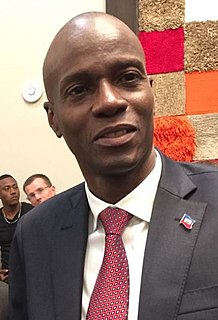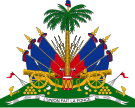
Jean-Bertrand Aristide is a former Haitian priest and politician who became Haiti's first democratically elected president. A proponent of liberation theology, Aristide was appointed to a Roman Catholic parish in Port-au-Prince in 1982 after completing his studies to become a priest of the Salesian order. He became a focal point for the pro-democracy movement first under Jean-Claude "Baby Doc" Duvalier and then under the military transition regime which followed. He won the Haitian general election between 1990 and 1991, with 67% of the vote and was briefly president of Haiti, until a September 1991 military coup. The coup regime collapsed in 1994 under U.S. pressure and threat of force. Aristide was then president again from 1994 to 1996 and from 2001 to 2004. However, Aristide was ousted in the 2004 coup d'état after right-wing ex-army paramilitaries invaded the country from across the Dominican border. As he claimed, the United States helped orchestrate the coup against him. Aristide was later forced into exile in the Central African Republic and South Africa. He finally returned to Haiti in 2011 after seven years in exile.

General elections were held in Haiti between 16 December 1990 and 20 January 1991. The presidential election, held on 16 December, resulted in a victory for Jean-Bertrand Aristide of the National Front for Change and Democracy (FCND), whilst the FCND also won the parliamentary elections in which voter turnout was 50.8%. It was widely reckoned as the first honest election held in Haiti since the country gained independence in 1804.

The 2006 elections in Haiti, to replace the interim government of Gérard Latortue put in place after the 2004 Haiti rebellion, were delayed four times after having been originally scheduled for October and November 2005. The elections finally took place on February 7, 2006, with turnout of around 60%. All 99 seats in the Chamber of Deputies of Haiti and all 30 seats in the Senate of Haiti were also contested. Run-off elections for the Chamber of Deputies of Haiti were held on 21 April 2006, with around 28% turnout.

Parliamentary elections in 2000 were held in Haiti in two separate sets of elections, on May 21, 2000 and July 9, 2000, for all 83 seats in the Chamber of Deputies and nineteen seats in the Senate, and later that year, at the same time as November 26, 2000 presidential election for eight Senate seats. The legislative elections and presidential elections in the fall ran largely smoothly, however the first and second rounds of the spring elections generated the most controversy.
Fwon Lespwa was a Haitian political coalition headed by René Préval, who served as president from 1996 to 2001 and from 2006 to 2011. The name Lespwa is the Haitian Creole form of the French l'espoir, meaning "hope". The coalition's full French name is Front de l'Espoir. Lespwa includes many members and former members of the last democratically elected government of Jean Bertrand Aristide and his Fanmi Lavalas.

The Struggling People's Organization, called until 1996 Lavalas Political Organization, is a Haitian political party originating from the Lavalas political movement. Formed in 1995, the more conservative Lavalas split from the party in 1996 forming their own Fanmi Lavalas party, at this time the OPL's name was changed from Organisation Politique Lavalas to its present appellation. This split meant that few of the intelligentsia that had previously supported Aristide ended up in the new Lavalas.

The Senate is the upper house of Haiti's bicameral legislature, the National Assembly. The lower house of the National Assembly is the Chamber of Deputies. The Senate consists of thirty seats, with three members from each of the ten administrative departments. Prior to the creation of the department of Nippes in 2003, there were twenty-seven seats. Senators are elected by popular vote to six-year terms, with one-third elected every two years. There are no term limits for Senators; they may be re-elected indefinitely.
Parliamentary elections were held in North Korea on 12 December 1972. Only one candidate was presented in each constituency, all of which were selected by the Workers' Party of Korea, although some ran under the banner of other parties or state organisations to give an appearance of democracy. Voter turnout was reported to be 100%, with 100% voting in favour of the candidates presented.

General elections were held in Haiti on 22 September 1957. Former Minister of Labour François Duvalier won the presidential election running under the National Unity Party banner, defeating Louis Déjoie, as well as independent moderate Clement Jumelle, who had dropped out on election day in a cloud of suspicions that the army was monitoring the election in favour of Duvalier. Former head of state Daniel Fignolé, considered a champion of poor blacks, was considered ineligible as he had been forcibly exiled months before the election, allegedly kidnapped.

Presidential elections were held in Haiti on 26 November 2000. The opposition parties, organised into the recently created Convergence Démocratique, boycotted the election after disputing the results of the parliamentary elections. The result was a landslide victory for Jean-Bertrand Aristide, who received 91.7% of the vote with a turnout of around 50%.

General elections were held in Haiti on 8 October 1950. Paul Magloire was the only candidate in the presidential election, and was elected unopposed.

Parliamentary elections were held in Haiti on 30 April 1961. They followed the dissolution of Parliament by President François Duvalier and the abolition of the Senate, making the Chamber of Deputies a unicameral body. Duvalier's National Unity Party won all 67 seats in the elections, which were later re-interpreted as presidential elections in order to give Duvalier a six-year presidential term and avoid the need for scheduled presidential election in 1963.

Parliamentary elections were held in Haiti on 12 February 1984. All but one of the candidates were members of the National Unity Party (PUN) of President Jean-Claude Duvalier. The PUN subsequently won all 59 seats.

Parliamentary elections were held in Haiti on 11 February 1973. Over 300 candidates contested the election, all of whom were members of the National Unity Party and supporters of President Jean-Claude Duvalier.

Parliamentary elections were held in Haiti on 6 April 1997 for one third of the seats in the Senate and two in the Chamber of Deputies. A total of 45 candidates from 15 parties contested the Senate elections.

Parliamentary elections were held in Ecuador on 1 June 1994. Only the district members of the House of Representatives were elected. The Social Christian Party emerged as the largest party, winning 26 of the 77 seats.

Parliamentary elections were held in Haiti on 9 August 2015, with a second round planned initially on 25 October. Two-thirds of the Senate and all members of the Chamber of Deputies were up for election.

Presidential elections were held in Haiti on 20 November 2016, after having been postponed several times.

Senate elections were held in Haiti with a first round on 20 November 2016, and a second on 29 January 2017. The first round were held simultaneously with the presidential elections and the second round of the parliamentary elections that still had a run-off pending in some constituencies since 2015.









